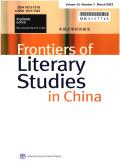沈绮颖:改革烈士的遗孀还是自己事业的殉道者?
IF 0.1
4区 文学
0 ASIAN STUDIES
引用次数: 0
摘要
摘要晚清女诗人沈绮颖(1877-1900)一直生活在其丈夫维新烈士林绪(1875-98)的阴影下。本文通过阅读沈奎英的诗作与林旭的诗作作对比,颠覆了人们对沈奎英贞洁寡妇的刻板印象,表明沈奎英本身就是一个改革家,她是林旭的灵魂伴侣,而不是林旭的哑巴妻子和寡妇。在她的诗歌和歌词中,沈绮颖明确表示,她努力学习诗歌是为了表达“一匹骏马的宏伟抱负”,她的诗歌传达了一个明确的信息,即她自己要成为中国改革时代的一名政治参与者,为国家和人民的福祉而奋斗。然而,由于一些微妙的原因,她无法通过亲自参与改革活动来实现这一雄心。受挫后,她决定做丈夫的支持者和保护者。正是因为沈绮颖把她的改革理想倾注在丈夫的事业上,林旭的处决对她来说是双重打击。她的消瘦至死,虽然符合一个看似晚期的帝国留洋模式,但超越了这一传统形象,并带有明显的改革时代的印记,当时一个女人将她的个人生活与国家和人民的命运紧密联系在一起。本文章由计算机程序翻译,如有差异,请以英文原文为准。
Shen Queying: A Reform Martyr’s Widow or a Martyress of Her Own Causes?
AbstractThe late Qing woman poet Shen Queying (1877–1900) had lived in the shadow of her husband, the reform martyr Lin Xu (1875–98). This paper subverts the conventional portrayal of Shen Queying as a chaste widow through reading her poems and song-lyrics in comparison with the poetic works of Lin Xu, to show that she herself was a reformer in her own right, and in this she was Lin Xu’s vocal soul-mate rather than his mute wife and then widow. In her poems and song-lyrics, Shen Queying made clear that she had endeavored in poetic learning for expressing “the grand ambition of a racing steed,” and her poetry sent unmistakable message to become a political player herself in China’s reform era, fighting for the welfare of the country and the people. For some subtle reasons, however, she was not able to fulfill this ambition by personally participating in the reform activities. Frustrated, she resolved to be a supporter and protector of her husband. Precisely because Shen Queying had put so much of her reform ideal into her husband’s career, the execution of Lin Xu fell on her as a double blow. Her pining away to death, although conforming to a seemingly late imperial lienu model, transcends this traditional image and bears a clear mark of the reform era, when a woman tied her personal life closely to the destiny of the country and the people.
求助全文
通过发布文献求助,成功后即可免费获取论文全文。
去求助
来源期刊

Frontiers of Literary Studies in China
Multiple-
CiteScore
0.10
自引率
0.00%
发文量
360
期刊介绍:
Frontiers of Literature in China seeks to provide a forum for a broad blend of peer-reviewed academic papers of literature in order to promote communication and exchanges between litterateurs in China and abroad. It will reflect the enormous advances made in China in the field of literature in recent years. In addition, this journal also bears the mission of introducing the academic achievements on Chinese literature research to the world. The coverage will include the following main branches of literature, both theoretical and applied: ancient Chinese literature, modern Chinese literature and contemporary Chinese literature.
 求助内容:
求助内容: 应助结果提醒方式:
应助结果提醒方式:


